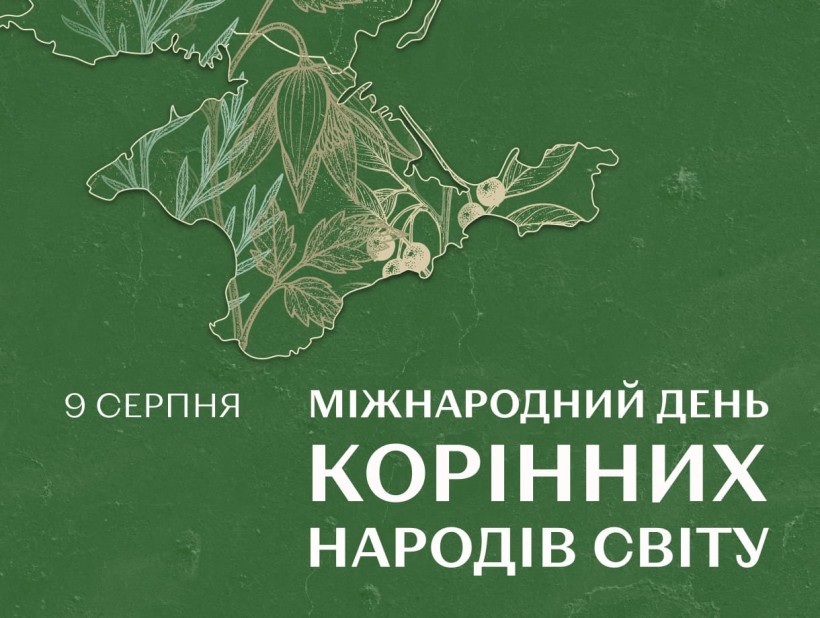
August 9 marks International Day of the World's Indigenous Peoples, established by the UN General Assembly in 1994.
The Law of Ukraine “On Indigenous Peoples of Ukraine” dated July 1, 2021, No. 1616-IX recognizes the Crimean Tatars, Karaites, and Krymchaks as indigenous peoples of Ukraine who formed on the territory of the Crimean Peninsula. This law guarantees that the indigenous peoples of Ukraine have the right to observe, revive, and develop their spiritual, religious, and cultural traditions and customs, as well as to preserve their tangible and intangible cultural heritage.
The indigenous peoples of Ukraine — Crimean Tatars, Karaites, and Krymchaks — are bearers of a deep historical continuity that has shaped the multicultural character of the peninsula. They have made a significant contribution to the linguistic, religious, architectural, and intellectual heritage of Ukraine. The Crimean Tatars, in particular, played a leading role in the political life of the region, including the creation of the Crimean People's Republic in 1917, which sought cooperation with the Ukrainian People's Republic on the basis of democratic self-determination. In 1991, the Crimean Tatar people unanimously supported Ukraine's independence and subsequently actively integrated into its political and cultural life.
The history of these peoples is full of difficult trials. The Karaites and Krymchaks were persecuted both under Soviet rule and during the Nazi occupation. The Karaites were repressed in the 1930s along with other religious minorities. The Krymchaks, on the other hand, were exterminated by the Nazis because of their Jewish origin: in 1941-1942, almost all members of this community were shot in Crimea. In May 1944, the Soviet authorities deported about 200,000 Crimean Tatars to Central Asia under conditions that led to the deaths of tens of thousands of people from starvation and disease.
Despite these difficult trials, the Crimean Tatars managed to preserve their national identity, return from deportation, and restore their own representative body, the Mejlis. They continued to develop their native language, literature, and culture and preserve their traditions. The Karaites left behind a unique religious heritage, including the kenesas in Yevpatoria, which still exist as historical monuments. The Krymchaks, despite their almost extinct population, are fighting to preserve the Krymchak language, religion, and customs.
Having annexed Crimea, the Russian Federation continues the policy of the Soviet authorities, consistently suppressing the national question in the public sphere, erasing identity, and promoting the idea of a “single Russian people” — both in Russia itself and in the occupied territories.
For years, Russian propaganda has been spreading fake news about the improvement of the Crimean Tatars' standard of living after the 2014 occupation, support for initiatives by the Russian occupation administration, and so on. In reality, the occupying forces are putting pressure on the Crimean Tatars, conducting searches in their homes and mosques, fabricating cases, persecuting and kidnapping people. August 9 is an additional opportunity to refute these myths with facts, stories of real people, and cultural markers that cannot be falsified. The more often the international media reports on oppression, deportations, and the destruction of languages, the closer we are to bringing the aggressor state to justice. Raising awareness of this issue is a proactive measure to ensure that the recognition of crimes becomes not only a moral but also a political and legal fact.
As of June 23, 2025, at least 220 people are in prison due to politically motivated persecution organized by the Russian occupation administration in Crimea. Of these, 133 are representatives of the Crimean Tatar people who are groundlessly accused of “terrorism” or “extremism.” These repressions are part of a deliberate policy aimed at suppressing any resistance, restricting fundamental freedoms, and displacing the indigenous people from their historical homeland.
In addition, as of July 17, 2025, at least 1,472 cases have been referred to the so-called “courts” under Article 20.3.3 of the Russian Federation's Code of Administrative Offenses, which provides for liability for the so-called “discrediting of the Russian Federation's armed forces.”
In 1,340 cases, sentences in the form of fines or other punishments have already been handed down, while 55 cases remain pending. Russia is normalizing violence, and almost every second person persecuted in occupied Crimea for their pro-Ukrainian position is a woman.
Ukraine is actively working to protect the rights of indigenous peoples. In July 2021, the Verkhovna Rada of Ukraine adopted the Law of Ukraine “On the Indigenous Peoples of Ukraine,” recognizing the Crimean Tatars, Karaites, and Krymchaks as indigenous peoples of Ukraine. This law guarantees their cultural, educational, and linguistic rights, as well as protection from forced assimilation or resettlement.
The International Day of the World's Indigenous Peoples is an opportunity to emphasize the importance of protecting the rights and cultures of the indigenous peoples of Ukraine, who, despite the occupation of Crimea, continue to fight for their identity. Their resilience, supported by Ukraine's legislative initiatives and international solidarity, is an example of strength of spirit and the pursuit of justice.
Based on materials from the Office of the President of Ukraine in the Autonomous Republic of Crimea